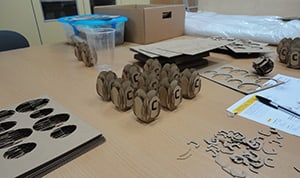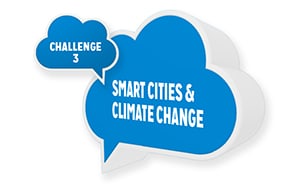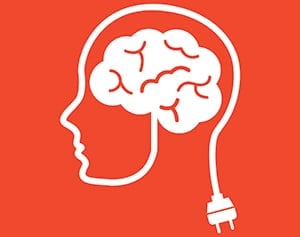 The exponential growth in technology we are currently experiencing heralds a radical restructuring of our societies, businesses and economies. One area where governments and citizens alike can expect technology to make an enormous impact is taxation.
The exponential growth in technology we are currently experiencing heralds a radical restructuring of our societies, businesses and economies. One area where governments and citizens alike can expect technology to make an enormous impact is taxation.
As new technologies emerge and converge, new ways of accessing or applying those technologies are also appearing. From open source technology to the Creative Commons and shared economy apps, the shift is towards making more data more available to more people. It’s a bottom-up, technology-driven empowerment of the people that has already hugely changed creative industries, and is moving to embrace professional services and manufacturing too.
Once writing, sharing and printing your opinion was in the hands of a distant, qualified, expert elite; now everyone can blog, post comments, create webpages or news sites, share pictures, print out documents or leaflets in high quality at home. The advances in technology that made this possible are continuing apace, enabling citizens to do more and more themselves.
A huge range of home-grown services and products will include DIY energy through solar power, DIY healthcare through in-body sensors, DIY education through on-line courses, DIY insurance, even DIY real estate through 3D printing. As technologies ramp up and to scale, prices will fall within reach of more than just new adopters – already, a 2 000m2 3D-printed concrete build costs no more than 50 000 USD.
As individuals increasingly do so much more for and by themselves, roles in society as it stands will come into question as the responsibilities and duties of citizens, governments and businesses towards each other are reshaped. A data-based, more democratized society where more people create and produce rather than merely consume will lead to civic engagement and organization at the local level, empowering local communities. Shared economy apps will enable a similar or greater sense of well-being and purchasing power, but at a reduced cost within the traditional economic framework. This will have a knock-on effect of lowering prices in general, reducing the number of government employees – and resetting expectations in terms of the tax burden.
Any renegotiation of the taxation status quo will shake governments, creating serious debate or even protest, with power is at stake and the whole top-down dynamic under threat. Citizens will demand changes in how much tax is paid and how it should be spent to reflect better the new ordering of responsibilities and roles. The public use of algorithms, big data in the hands of the people, will force governments to be increasingly accountable for optimized spending, for transparency and justifiable levels of taxation.
Open data initiatives, cameras, sensors and drones will enable citizens and consumers to scrutinize the behavior of corporates and governments alike, establishing a fairer balance of power than the current asymmetric set up. So government must prepare for a transition to a smaller, more efficient role with a different scope, facilitating and enabling citizens rather than driving and organizing structures and solutions as at present.
In emerging markets, this can be of enormous benefit to governments able to skip over whole chunks of the evolutionary trajectory of developed markets towards swifter innovation, unencumbered by the deadweight of historic, increasingly redundant legislation, technologies or incumbents.
If governments must change to be more responsive to exponential change, in particular given radical shifts in civic engagement and the taxation base, then so must private sector organizations. New models for the new era involve dramatic decentralization of employees, crowdsourcing, flexibility and scalability of assets, data algorithms and collaborative, bottom-up approaches.
The big challenge lies in making organizations, whether corporate or public sector, exponential. That means responsive, flexible, transparent, decentralized, experimental and collaborative. It calls for engagement and involvement with and by citizens. It calls for a radical repositioning of the main stakeholders in society, government, business and individuals, with major economic implications including an overhaul of tax structures. The importance of going exponential will be my main message at the ITU Telecom World 2014Leadership Summit on the Future this December in Doha.






 The challenges of embracing the digital era are bringing us into a perfect storm of change. Old systems designed for a pre-Internet world are reaching their limit, overwhelmed by massive economic, financial and political uncertainty, increasing complexity, major environmental pressures, and dramatic, disruptive developments across multiple fields of science and technology. As a result, business cycles are accelerating and shortening, governments are under growing pressure to respond and adapt, and individuals are facing disruption in every aspect of their lives, from job security and financial uncertainty to the reshaping of education and healthcare.
The challenges of embracing the digital era are bringing us into a perfect storm of change. Old systems designed for a pre-Internet world are reaching their limit, overwhelmed by massive economic, financial and political uncertainty, increasing complexity, major environmental pressures, and dramatic, disruptive developments across multiple fields of science and technology. As a result, business cycles are accelerating and shortening, governments are under growing pressure to respond and adapt, and individuals are facing disruption in every aspect of their lives, from job security and financial uncertainty to the reshaping of education and healthcare.
 24 innovative minds are headed to Linz, Austria for the
24 innovative minds are headed to Linz, Austria for the 
 Whether you live to work or work to live, for the vast majority of people throughout the world having a job of some sort is central to the way our lives are structured. So what happens when the drones and the robots take over?
Whether you live to work or work to live, for the vast majority of people throughout the world having a job of some sort is central to the way our lives are structured. So what happens when the drones and the robots take over?
 The ITU Telecom World Young Innovators Competition in partnership with the World Health Organization (WHO) is looking for innovative ideas on how information and communication technologies (ICTs) can help smart cities to slow down or mitigate the effects of climate change for the benefit of global health.
The ITU Telecom World Young Innovators Competition in partnership with the World Health Organization (WHO) is looking for innovative ideas on how information and communication technologies (ICTs) can help smart cities to slow down or mitigate the effects of climate change for the benefit of global health.
 Affordable prosthetic limbs for Sudanese soldiers manufactured on 3D printers, grandmothers bringing the know-how on running solar electricity generators back to their remote villages, electric light powered by a bag of earth and gravity alone, powerful yet cheap batteries to power drones used in disaster management. Projects such as these may not be the most visible face of the dramatic growth of new technologies – but their impact on local communities across the developing world is nothing short of revolutionary.
Affordable prosthetic limbs for Sudanese soldiers manufactured on 3D printers, grandmothers bringing the know-how on running solar electricity generators back to their remote villages, electric light powered by a bag of earth and gravity alone, powerful yet cheap batteries to power drones used in disaster management. Projects such as these may not be the most visible face of the dramatic growth of new technologies – but their impact on local communities across the developing world is nothing short of revolutionary.
 We live in exciting times. Times full of the promise of progress, where the exponential pace of technological development is both visible and beneficial to ever more of the world’s population. From e-medicine to digital education, next-generation transport systems to smart grid solutions, the near future looks to be healthier, smarter, greener, less wasteful of natural and financial resources.
We live in exciting times. Times full of the promise of progress, where the exponential pace of technological development is both visible and beneficial to ever more of the world’s population. From e-medicine to digital education, next-generation transport systems to smart grid solutions, the near future looks to be healthier, smarter, greener, less wasteful of natural and financial resources.
 More than 200 entries from 48 countries worldwide, hundreds of ideas, comments and unique perspectives on the creation of local digital content, many hours of serious consideration by our panel of judges – and the winners of the
More than 200 entries from 48 countries worldwide, hundreds of ideas, comments and unique perspectives on the creation of local digital content, many hours of serious consideration by our panel of judges – and the winners of the 
